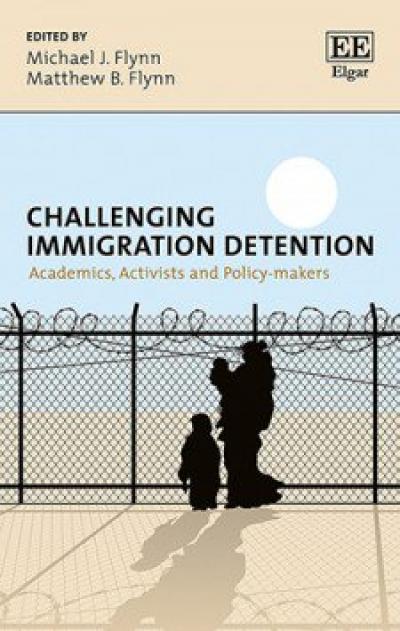Book Review: Challenging Immigration Detention. Academics, Activists and Policy-makers
Posted:
Time to read:
Guest post by Sarah M. Hughes, Teaching Fellow in Political Geography at Durham University’s Department of Geography. Her research brings into conversation literatures on creativity with debates on resistance in the UK asylum system. Follow Sarah on Twitter @Sarah_Hughes90
Review of Challenging Immigration Detention. Academics, Activists and Policy-makers edited by M J Flynn and MB Flynn (Edward Elgar Publishing, 2017).

The reader is introduced to a wide range of perspectives from policy-makers, activists and advocates across the globe. Opening the contributions is Nina Bernstein, investigative journalist for the New York Times, who focuses on the challenges of researching immigration detention and on the importance of an independent media to facilitate meaningful change. Dora Schriro, former Special Advisor to the Secretary of the Department for Homeland Security in the US chronicles the rapid expansion of family detention under the Obama administration, commenting that “immigration reform was not among the government’s top priorities” (p33). In a UK policy context, Hindpal Singh Bhui, from Her Majesty’s Inspectorate of Prisons (HMIP), looks at the impact of this organisations’ scrutiny on immigration detention. He notes that the HMIP does not have the power to force compliance with their recommendations, and that their aim is to improve the treatment of detainees rather than overhaul the system. Also working ‘within’ the detention system are Brooker, Albert, Young and Steel whose contribution look at the provision of mental health services in Australian detention centres, “a zone that is excised from the usual conventions of clinical transparency and communication” (p.196). The authors describe the mental health issues caused and exacerbated by the condition(s) of detention, and propose a model of care to develop resilience during detention. Muñoz and Young look at the activism of the National Immigrant Youth Alliances (NIYA) in the USA, who have worked to infiltrate immigration detention centres by getting themselves arrested, and trying to stop deportations from the ‘inside.’ In doing so they provocatively challenge the “white saviour/ally” narrative that can dominate accounts in this area (p.106).
In addition, this volume covers legal challenges to immigration detention. From the UK, Wilsher looks at the presumption of liberty in relation to the detention of migrants, analysing the challenge of separating “immigration from criminal punishment in the context of constitutional law” (p.7). Cornelisse, looks more broadly at the EU directives around the regulation of detention, mapping out EU legal instruments and European Court of Justice case law in relation to Article 5 of the European Court of Human Rights. Ceriani Cernadas, a member of the UK committee on the Rights of Migrant Workers interrogates the commitment by South American countries not to criminalise irregular migrants, and Grange and Majcher from the Global Detention Project look at the emergence of immigration detention at a global scale in relation to the discourses and legal frameworks around international human rights.
This edited volume also includes a broad range of academic contributions: criminologist Mary Bosworth explores immigration detention and penal power, arguing for more research inside UK detention centres; geographers Deidre Conlon, Nancy Hiemstra and Alison Mountz discuss “detention as a form of spatial control” in the context of a multiplicity of bordering practices, [like…] (p. 142); anthropologist Nicholas De Genova explores the uneven economy of detainability, i.e. the uneven distribution of the techniques, rationalities and conditions of deportability, and sociologist Matthew B. Flynn examines the economy of detention, looking at labour markets in the context of a global proliferation of immigration detention. These rich academic interdisciplinary perspectives complement and extend the discussions of policy-makers and activists in this area.
These contributions are bought together by Michael J. Flynn in the volume’s Conclusion, where he argues that there is not a ‘best strategy’ to combating detention. Drawing upon Grant Mitchell’s contribution on the promotion of alternatives to detention, Flynn explores ankle bracelets and other restrictive alternatives to detention. This discussion of alternatives to detention could perhaps have engaged with moves within carceral geography to expand understandings of a site of confinement beyond traditional boundaries and into such ‘community’ measures. Furthermore, I do wonder if the editors of the volume could have done more to discuss the implications of their framing of the debates around challenging immigration detention as either co-option or opposition; from ‘inside’ the system or ‘outside’ the system. Here I would push the editors to think through the limitations as well as the conceptual purchases of such a framing of these conversations.
One of the major successes of this volume is the effort by the editors to ensure that the authors’ language is accessible to a wide audience. This, they note, was done by encouraging the authors to “review and comment on early drafts of other chapters in the volume from different disciplines” (p.6). The result is work that is rich in its interdisciplinary scope and yet is accessible. Taken together these chapters form an important and compelling volume, which is an excellent contribution to those interested in challenging immigration detention.
Any comments about this post? Get in touch with us! Send us an email, or post a comment here or on Facebook. You can also tweet us.
__________
How to cite this blog post (Harvard style)
Hughes, S. M. (2018) Book Review: Challenging Immigration Detention. Academics, Activists and Policy-makers. Available at: https://www.law.ox.ac.uk/research-subject-groups/centre-criminology/centreborder-criminologies/blog/2018/05/book-review (Accessed [date]).








